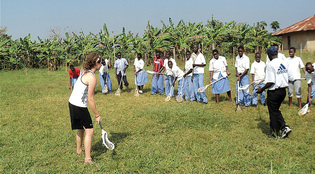 loading
loading
Sporting LifeA summer of lacrosse—in Uganda Courtesy Kerry Hamill ’12Kerry Hamill ’12 (left) teaching lacrosse in Kkindu Village. View full image
When you think of the needs of children in the developing world, help with their lacrosse skills is probably not the first thing that comes to mind. But Kerry Hamill '12, a junior on Yale's women's lacrosse team, spent part of her summer on a makeshift soccer field in Uganda—with grazing cows serving as out-of-bounds markers—teaching schoolchildren equipped with donated sticks how to play a game most of us associate with the leafy suburbs of Baltimore. Hamill, a Baltimore suburbanite herself, was one of six volunteers who went to Kkindu Village in central Uganda to volunteer with Fields of Growth, a nonprofit that blends lacrosse and social welfare projects. "Lacrosse is the hook" for the collegiate volunteers, says Kevin Dugan, director of men's lacrosse at Notre Dame (and a former Yale assistant coach), who founded the organization last year. "But I know that so much more is going to happen when they go over there and have their world view turned upside down." The volunteers work on microfinance, education, and aid projects, mostly involving children, with after-school lacrosse clinics a constant but complementary part of the program. "Going in cold, teaching a completely foreign game, and add on top of that the language barrier—it certainly has been challenging," says Hamill. "But the joy they get from it is so amazing. And it's fun that I've been able to teach the game and have them get the same joy out of it that I have." Fields of Growth recently started a poultry-rearing project in the village for AIDS widows. Hamill visited one such family in late June, meeting a mother and her six children. The youngest, an eight-month-old named Christine, is HIV-positive. "I've of course always heard of children being born with HIV," Hamill wrote in an e-mail. "But to actually be holding such a small piece of life in my arms. … It was an experience that showed me that the faceless 'HIV-ridden Africans' that we hear about all the time at home is not just a no-name group." On July 11, suicide bombers targeted the large crowds gathered in Kampala, the Ugandan capital, to watch the World Cup final on television. More than 70 people died, including an American aid worker. Hamill was an hour away, in Jinja, but she had spent a day at the beginning of her trip at the site of the blasts. She was shaken by the tragedy, she says. Nevertheless, she chose to stay in Uganda to finish her work. "I tend to live my life with rose-colored glasses on, so it was tough to have my idealism shattered like that," she said in late July. "But I'm glad I've been able to make it out with a stronger perspective. I came here knowing that I wasn't always going to be comfortable."
The comment period has expired.
|
|